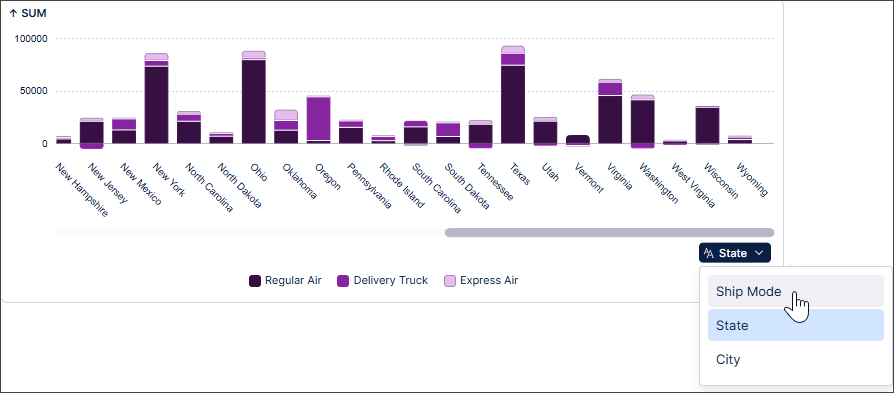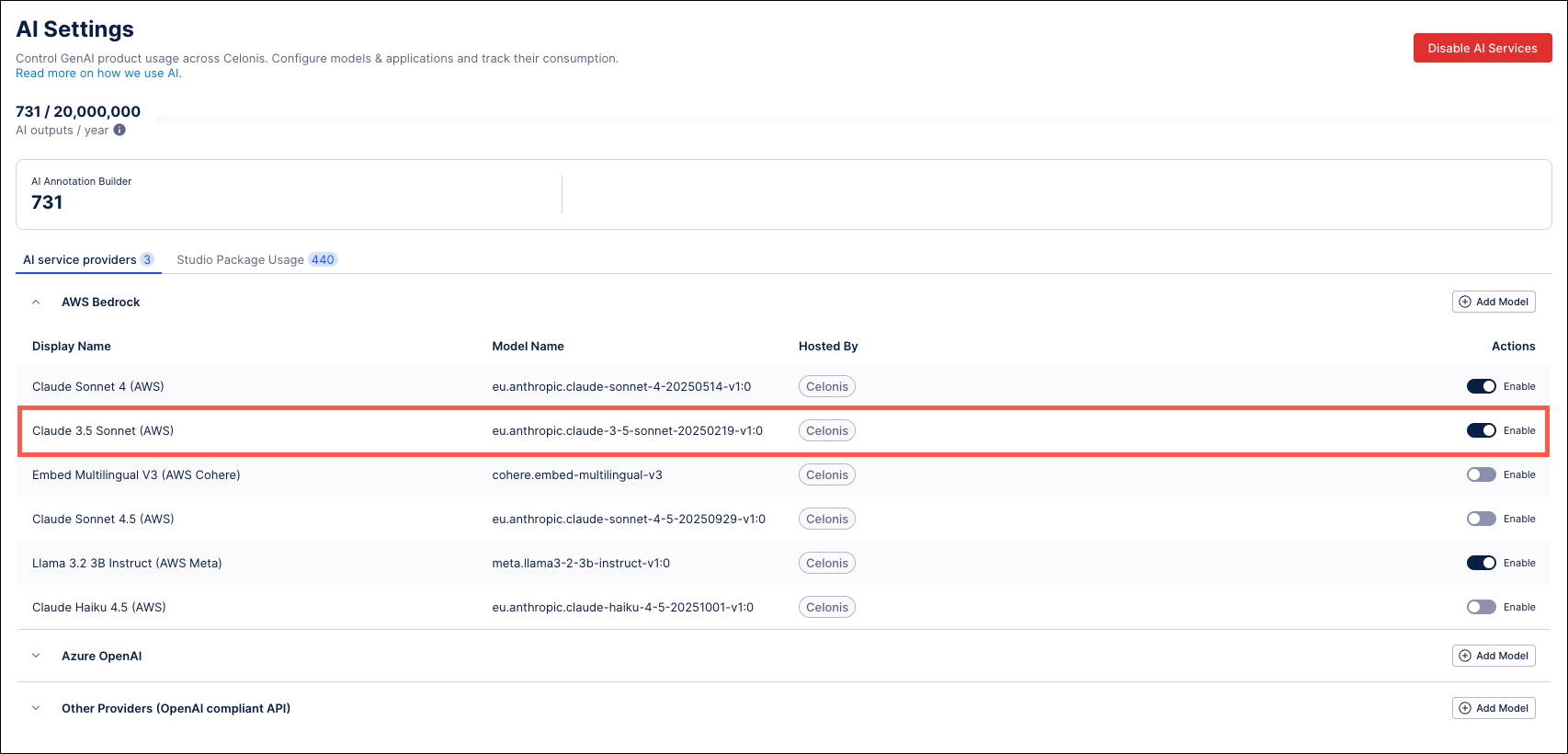Upcoming changes
This section lists planned feature releases as well as advance notices about updates that may impact existing functionality.
We recommend checking here regularly to stay ahead of any changes that could affect your setup.
The features listed below are planned for release in the coming months. This information is provided to give you an early look at what’s coming. Release timelines may change, but we aim to keep them as accurate and up to date as possible, with regular updates.
February 2026
IMPROVED PROCESS DESIGNER Bugfixes
This release focuses on "under-the-hood" excellence and highly requested fixes for escalated customers:
Improved loading speeds for the Orphan view
Enhanced security and data consistency across the platform
UI updates:
Added alphabetical sorting for corona objects (to improve searchability)
Resolved the "grayed out" Refresh button issue
March 2, 2026
STUDIO Dimension switching in charts
Dimension switching enables faster, more flexible self-service analysis, allowing users to explore multiple data perspectives within a single chart for quicker insights and a better experience.
Users can now dynamically adjust the data in bar, column, line, and area charts by enabling dimension switching.
Previously, users couldn't easily switch between visualizing data on a weekly and a monthly basis.
With dimension switching, users can now change the data perspective displayed using a simple dropdown in the chart.
In this example, the user can select whether to display the Sum data by Ship Mode, State or City.
 |
To find out more, see Charts.
April 2026
NEW DATA INTEGRATION Java requirement for on-prem JDBC
Starting April 2026, upgrading to the latest on-prem JDBC JAR will require Java 25. This is not a breaking change, as customers who do not update their extractor to the latest JDBC version will not be affected. We will update this page with the exact release version once it is finalized. No immediate action is required, but upgrades should be planned in advance.
To learn more about the on-prem JDBC extractor, see: JDBC Extractor.
The following updates introduce changes that may not be fully compatible with previous versions.
We’re providing this information ahead of time to help you prepare and make any necessary adjustments before the updates roll out.
February 6, 2026 through to March
REMOVED BUSINESS MINER Deprecating Business Miner service (February through March)
Our Business Miner service is being deprecated and has already been replaced by our AI-driven Insight Explorer and Studio features.
With these advanced capabilities, you’ll benefit from:
Enhanced intelligence: Advanced AI integration and deeper customization options.
No additional cost: These features are already included in your Celonis Platform offering and can be used today at no extra cost.
Easy transition: With our Celonis Academy course, you can efficiently transition away from Business Miner.
Business Miner will be deprecated in three phrases depending on your teams' current service usage:
Phase one (Feb 6, 2026): Business Miner navigation item will be moved down a level and an in-platform notification will inform your users of the forthcoming deprecation.
Phase two (Feb 16, 2026): Business Miner navigation item will be removed from the navigation bar, with no access available to users. As our Quickstarts feature rely on the use of Business Miner features, we will also remove these from the platform.
Phase three (from March 2026): Business Miner will be removed from the Celonis Platform and no access will be available to users.
Each phrase will be announced in both our release notes and via in-platform notifications.
To learn more about Insight Explorer, see: Insight Explorer
REMOVED TRANSFORMATION CENTER Deprecating Transformation Center service (February through March)
Transformation Center is being deprecated as its features transition into our more powerful Transformation Hub. With improved AI-driven insights and more precise KPI tracking, Transformation Hub is included in your existing Celonis Platform subscription at no additional cost.
Transformation Center will be deprecated in three phrases depending on your teams' current service usage:
Phase one (Feb 6, 2026): Transformation Center navigation item will be moved down a level and an in-platform notification will inform your users of the forthcoming deprecation.
Phase two (Feb 16, 2026): Transformation Center navigation item will be removed from the navigation bar, with no access available to users.
Phase three (from March 2026): Transformation Center will be removed from the Celonis Platform and no access will be available to users.
To learn more about Transformation Hub, see: Transformation Hub.
March 1 to April 28, 2026
REMOVED STUDIO Deprecating support for Claude 3.5 and 3.7 Sonnet models in Celonis AI products (March / April)
Beginning March 1, 2026, Celonis AI products will no longer support the use of the Claude 3.5 Sonnet large language models (LLM). Support for the Claude 3.7 Sonnet model will be deprecated on April 28, 2026. These changes may impact the models used by your Celonis products including Action Flows, Annotation Builder, Machine Learning Workbench (MLWB), and Process Copilot.
Note
After these deprecation dates, any Celonis product utilizing these versions of the Claude Sonnet LLM will no longer function until the product is upgraded to use a newer model. Newer versions of the Claude Sonnet LLM will still be supported.
This change is necessitated by periodic updates made to third-party AI models such as those from providers such as Amazon Bedrock, Anthropic (Claude), or Azure OpenAI. These newer models are more capable and can offer improved performance for your Celonis products.
To verify the currently assigned model for your AI products, go to Admin & Settings > AI Settings and check if the “Claude 3.5 Sonnet” or "Claude 3.7 Sonnet" models are enabled. You can also click the Studio Package Usage tab to see which individual products have the Claude 3.5 or 3.7 Sonnet models assigned.

If any of your products are currently using the Claude 3.5 or 3.7 Sonnet models, you will need to update the configuration for each tool individually and select a different model prior to the respective deprecation dates. There is currently no method for updating all your models automatically.
Note
Process Copilots with the Select LLM field set to “Automatic Selection” in the AI Instructions will automatically switch to a different model if the original LLM is not available.
For more information, see AI Settings.
March 31, 2026
BREAKING ADMIN Decommissioning API and application keys: Action required before March 31, 2026 [new date]
Important
These changes affect users who currently use API keys and/or application keys for the Audit Log, Platform Adoption and Team Login History APIs.
If you don’t use APIs or application keys in your applications or in third-party systems for these APIs, these changes will not affect you and no action is required.
Why we’re making these changes
We’re moving away from using API and application keys to the OAuth 2.0 authorization standard to provide a more secure, streamlined and efficient developer journey.
Users currently generate long-term API keys or application keys in the Celonis Platform. These keys are then embedded in applications and allow data to be requested or pushed using Celonis APIs. As these keys typically have a long life, cannot be rotated and their scope cannot be limited, any application with an embedded API or application key can access almost all Celonis APIs.
With OAuth 2.0, scoping means OAuth-enabled clients can access permitted APIs only. This follows the security principle of least privilege so an OAuth client only has the privileges required to perform a certain task.
Action required before March 31, 2026
Identify any systems and/or applications that use API or application keys to call any of the following APIs:
Audit Log API.
Platform Adoption API.
Team Login History API.
Migrate these systems and/or applications to OAuth 2.0.
Additional points to consider:
If you were part of the beta program of the Platform Adoption Monitoring App and you're still using AppKeys, you must migrate to OAuth 2.0.
If you use the Celonis User Adoption dashboards, which extracts Platform Adoption data through Action Flow, you must migrate to the new Celonis Platform Adoption Monitoring App.
If you build your own Platform Adoption Extractor using the Celonis Platform Adoption Template and you selected AppKey as the authentication method, you must migrate to OAuth.
If you use Celonis Platform Adoption Monitoring App V1.3, no action is required. This version already uses OAuth.
The Platform adoption statistics under Admin & Settings will continue to work. No action is required.
For information on enabling OAuth 2.0 on the Celonis Platform, see Using an OAuth 2.0 token in Celonis.
Note
In future, we're aiming to move to OAuth 2.0 for all Celonis use cases. If you're using other Celonis APIs that already support OAuth 2.0, you can move to OAuth 2.0 for these APIs too. We’re also adding OAth 2.0 support for Action Flows and on-premise clients and will let you know when this is available
December 31, 2026
BREAKING DATA INTEGRATION Deprecating SAP on-prem extractor: Action required before December 31, 2026
Celonis is fully deprecating and discontinuing support for the SAP on-premise extractor (OPE) by the end of December 2026. All data pipelines currently relying on OPE will cease to function on this date.
Important
To ensure continuity of data flow, all customers using OPE must migrate to the modern On-Premise Client (OPC) by the end of December 2026.
This change is driven by a necessary update to our authentication security model. The outdated key-based authentication mechanism used in OPE is being replaced by the industry-standard OAuth protocol in OPC. To align with modern security requirements and maintain data pipelines, the entire legacy OPE framework will be shut down by the end of 2026. Any SAP Extractor running on the OPE after this date will stop working.
We recognize that some customers rely on specific OPE features which are not yet available in the OPC. These features are currently under development and we plan to deploy them in Q4 2025. We will communicate the exact release dates for these features in our Release Notes.
The following OPE features are currently not yet fully supported by the OPC:
Extraction via PI/PO
Extraction from legacy SAP versions 4.6 and 5.0
Column value filter functionality
Calculated columns